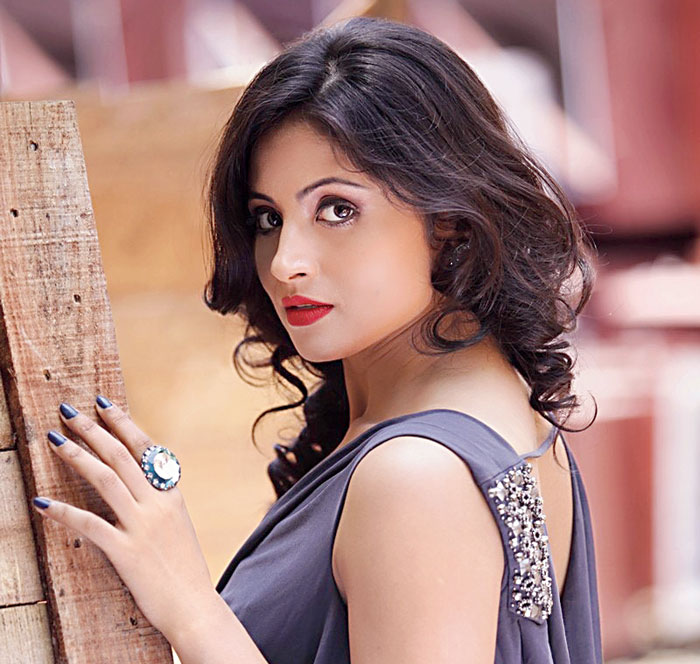An alumnus of the Film and Television Institute of India (FTII), actress Auroshikha Dey stars in the feature film The Warrior Queen Of Jhansi releasing on November 29.
In the film based on the 1857 Mutiny, Auroshikha features as Jhalkari Bai who played an important role during the uprising by serving in the women’s army of Rani Lakshmi Bai of Jhansi. At the height of the siege of Jhansi, she disguised herself as the queen and fought on her behalf on the front, allowing the queen to safely escape the fort. The Telegraph caught up with Auroshikha to find out more…
A number of films have been made over the years on Jhansi ki Rani, more recently the Kangana Ranaut-starrer Manikarnika. How is this film different?
I am glad that we are making films celebrating women freedom fighters. The more the merrier. I will let the audience decide how similar my film is to the other narrations. Having said that, The Warrior Queen Of Jhansi is an international film and I am really looking forward to audience reactions.
People don’t know much about Jhalkari Bai’s contribution alongside Rani Lakshmi Bai in the 1857 Rebellion. How did you research this character?
That is true. Even I wasn’t aware of Jhalkari Bai until I played the part. So I had the privilege to go through a lot of research on her and was completely awestruck to learn about her contributions. We seldom celebrate women’s contribution in our struggle for Independence. A thorough research was therefore needed to blend with the essence of the character. I studied her background and how Rani Lakshmi Bai got her to join the army. My research also took me to an article where a commemorative postage stamp was issued by the Department Of Posts in her honour. On meeting her, one of the generals of the British forces is believed to have said: “If even one per cent of Indian women were like Jhalkari, the British would very soon have to leave India.” Knowing her story and playing her glorious part has been a true honour.
Did you train in sword fighting and archery for this role?
Yes, I did. Jhalkari Bai was a brave and courageous woman. I had to make sure my body language and gait matched her personality. She was a fearless warrior and I had to ace myself in the crafts of war like sword fighting, archery and horse riding. I am not a master in any of them and that’s why I went through vigorous training and enjoyed every bit of it. To learn and master something that you never learnt makes it even more exciting. I did fail initially but I never gave up until I aced it.
What was the experience of working with noted British actors like Rupert Everett and Nathaniel Parker?
I was fortunate enough to work with an amazing set of British actors and share the screen with them. It was a privilege to work with such an eminent set of actors like Rupert and Nathaniel Parker. We used to discuss before every scene on how we would execute the take so that our characters came alive seamlessly. It was humbling to see how grounded everyone was despite their many accomplishments.
How do you apply your training from FTII on sets as a professional actor?
Well, being from an institute like FTII does help an actor understand a character in a much better way. My FTII training helped me blend with Jhalkari Bai in many ways. I studied her from not just one but every angle to get a holistic view into what shaped her into this woman of incredible valour. Her journey from humble beginnings as a village girl to becoming a fearless warrior in the women’s wing of the Rani’s army. It helped me understand her relationship with the Rani in many ways. I left no stone unturned in my endeavour to become Jhalkari Bai.
How did you land this role?
I remember opening a tabloid one day and reading about the part of Jhalkari Bai in Manikarnika (Ankita Lokhande played the part in Kangana’s film). Yes, I was a bit disappointed for not getting the part. But to my surprise, after a month I got an audition call for the same part in our film. And so began my journey in The Warrior Queen Of Jhansi.
What are some of the challenges you faced while shooting?
Shooting under the scorching sun in Rajasthan is not an easy feat. The take needs to be perfect every time. I practised my skills in sword fighting and archery every single day. Since I was novice, I remember accidentally releasing the bow string and bruising my arm. But when you love what you do, you hardly notice anything happening to you. You become what you play. I was the unflinching, fearless Jhalkari Bai. Shooting at Ouarzazate in Morocco - home to the Atlas Studios - was another adventure. It was chilly and I was shooting my fighting scene in 2°C without blinking. She was a force to reckon with. I guess I love what I do. So, bring it on, I say!
What brief did director Swati Bhise give you about the character? Did you have any questions for her?
My director Swati Bhise, being a woman, intricately understood the character, her struggle and helped me on every step to mould with it. It really was Swati ma’am’s determination and her impeccable vision that allowed for such a magnanimous project to be put together. She could extract each and every emotion through us and explain them beautifully. She told us that the film is not just about Rani Lakshmi Bai but about women empowerment. Yes, I did have questions and she was always available to answer them.










